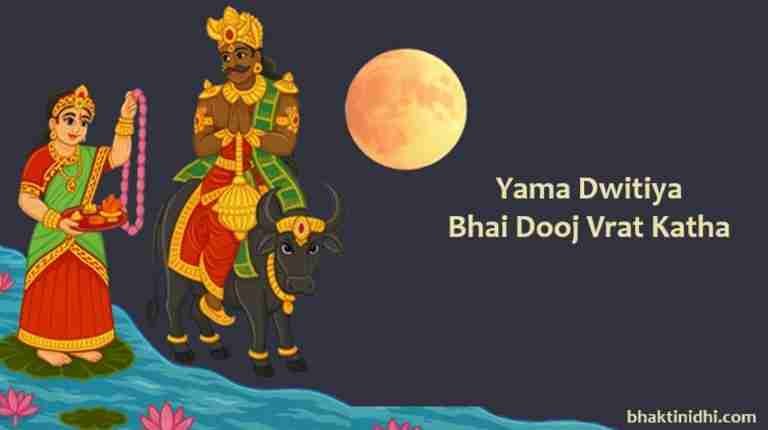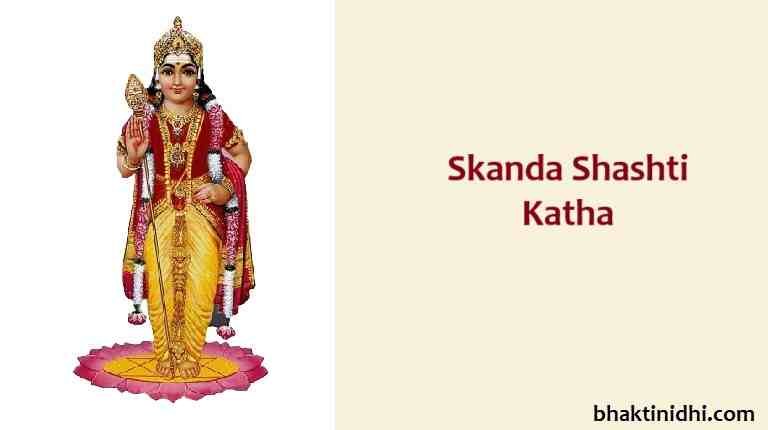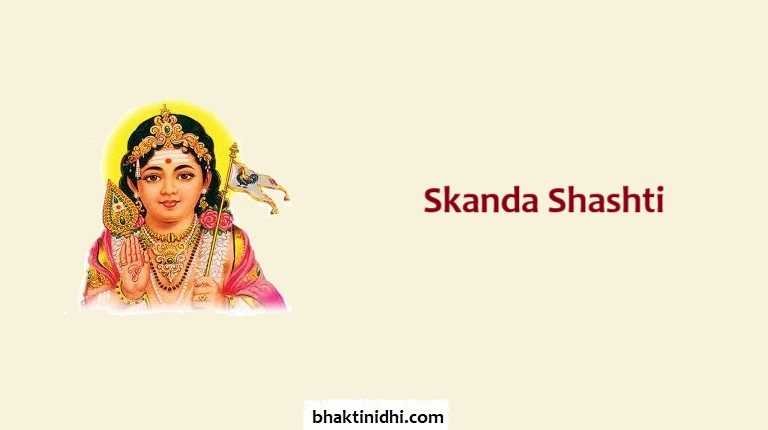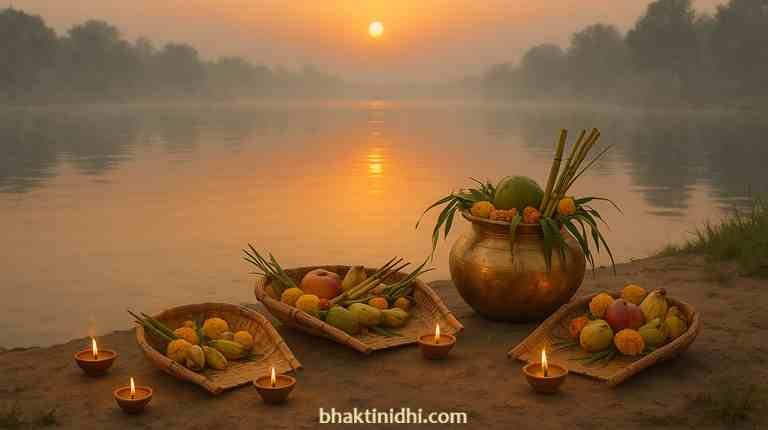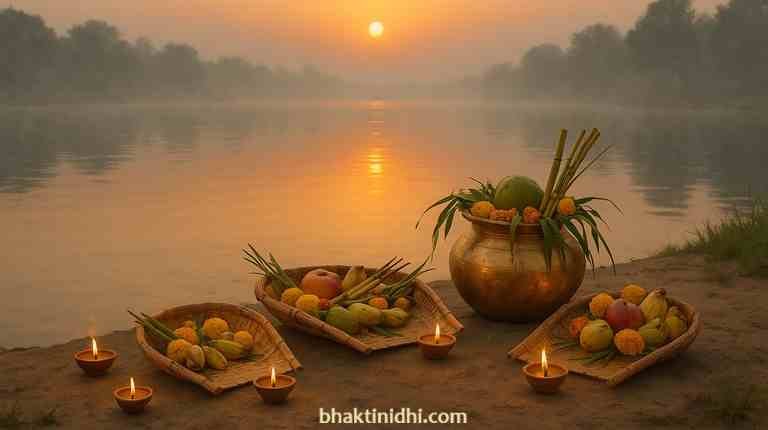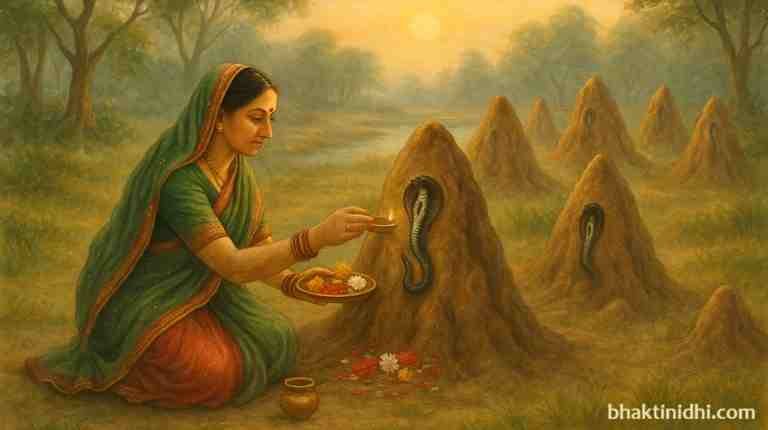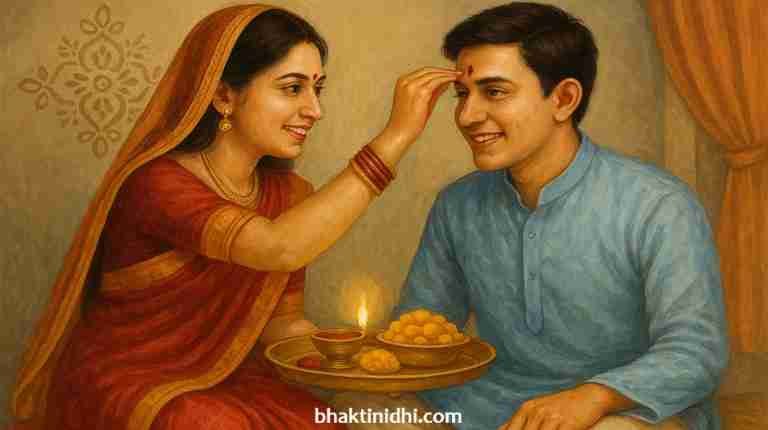Bhai Dooj Vrat Katha (or Bhaiya Dooj Vrat Katha) is a sacred story that is recited or heard as part of the Bhai Dooj festival rituals. It is also called Yama Dwitiya Katha. It is described in Sanat kumara samhita, where Rishi Valakhilya explains this to other sages.
Bhai Dooj Vrat Katha or Yama Dwitiya Katha
Rishi Valakhilya said:
“The second day (Dwitiya) of the bright fortnight of the month of Kartika is known as “Yama Dwitiya”. On this sacred occasion, Lord Yama (the God of Death) should be worshipped in the evening.
In ancient times, there was a story: once, Queen Yamuna (the river goddess and sister of Yama) used to pray daily to her brother Lord Yama, saying – ‘O brother! Please come to my home with all your dear friends and partake of food.’ Yama would reply, ‘I will come tomorrow or the day after. I remain very busy with my duties and find no leisure.’
One day, Goddess Yamuna invited Yama very firmly. Accepting her invitation, Lord Yama came to her house on the second day of the bright fortnight of Kartika. Before arriving, Yama released all beings from his noose (symbol of death) and came to Yamuna’s abode with his divine attendants.
Yamuna lovingly welcomed her brother, prepared many delicious dishes, and offered him fragrant oils for bathing. After applying unguents and bathing him in pure water, she adorned him with fine garments, ornaments, sandal paste, and garlands. She then served him a sumptuous meal in golden plates filled with various delicacies. After the meal, Yama too worshipped his sister with beautiful clothes and ornaments.
Then Yama said to his sister Yamuna, ‘Dear sister, ask for whatever boon you desire.’
Yamuna replied, ‘O brother, please visit my home every year on this day. Also, whoever eats food from the hands of his sister today, as you have done, may you always free such sinners from your noose. Grant them happiness and prosperity forever. This is the boon I seek from you.’
Hearing this, Lord Yama said, ‘O daughter of the Sun! Whoever bathes and offers libations to ancestors and gods in your holy waters and then eats food at his sister’s house on this day shall never see the gates of Yama’s abode. On the northeastern side of Mount Kailasa lies a sacred place called “Yamatirtha”. One should bathe there, offer water to the ancestors and deities, and then, seated quietly before the Sun at noon, chant these names: Yama, Nihanta, Pitriraj, Dharmaraj, Vaivasvata, Dandadhara, Kala, Bhutadhipa, Dattakritanusari, and Kritanta.
Afterward, he should go to his sister’s house. The sister should respectfully serve food to her brother, saying, ‘O brother, I am your younger sister. Please accept this sacred meal for the pleasure of Lord Yama and Goddess Yamuna.’ Then the brother should satisfy his sister with gifts of clothes and ornaments. Whoever performs this ritual will never even dream of Yama’s world.
On this day, even kings should release all prisoners and send them to dine at their sisters’ homes. Yama further said, ‘Today I will also free sinners from hell. But those kings who imprison anyone today will certainly be punished by me.’
If a man has no younger sister, he should dine at his elder sister’s house; if he has no elder sister, then at his mother’s sister’s house. If that too is not possible, he should go to the house of his paternal uncle or cousin. If none of these relations exist, he should go to his maternal cousin’s house. If even she is not available, he should consider any woman of the same ‘gotra’ (clan) as his sister. If there is none, then he should treat a close family friend as his sister and eat at her house. If that too is not possible, he should symbolically treat a cow, a river, or even a garden (*vatika*) as his sister and eat nearby.
O Devi! One should never eat at one’s own house on Yama Dwitiya. Those wicked people who do so fall into hell. On this day, one must lovingly eat nourishing food served by one’s sister and give her special gifts.
On the second day of the month of Shravana, one should eat food from the hands of a paternal uncle’s daughter; in Bhadrapada, from a maternal uncle’s daughter; and in Ashwin, from an aunt’s or father’s sister’s daughter. But on the bright second day of Kartika, it must be from one’s own sister.”
After describing the greatness of Yama Dwitiya, Lord Yama, the god of righteousness, departed to his city named “Sanyamani”.
Rishi Valakhilya further said:
“O sages! who observe the Kartika vows! On Yama Dwitiya, go to your sister’s house and eat food served by her hands. Do not doubt these words, for they are the supreme truth. Lord Surya himself declared: ‘Whoever does not eat food from his sister’s hands on Yama Dwitiya loses the merit of all good deeds done throughout the year. Any woman who feeds her brother and offers him betel on this day will never become a widow, nor will her brother’s life be shortened.
When the Dwitiya tithi lasts till the afternoon, that is the right time for the brother to eat. If due to ignorance, delusion, staying abroad, or being imprisoned, someone cannot eat from his sister’s hand, then by listening to this story of Yama Dwitiya, he attains the same merit as if he had done so.’
Thus ends the story of the Yama Dwitiya !!
